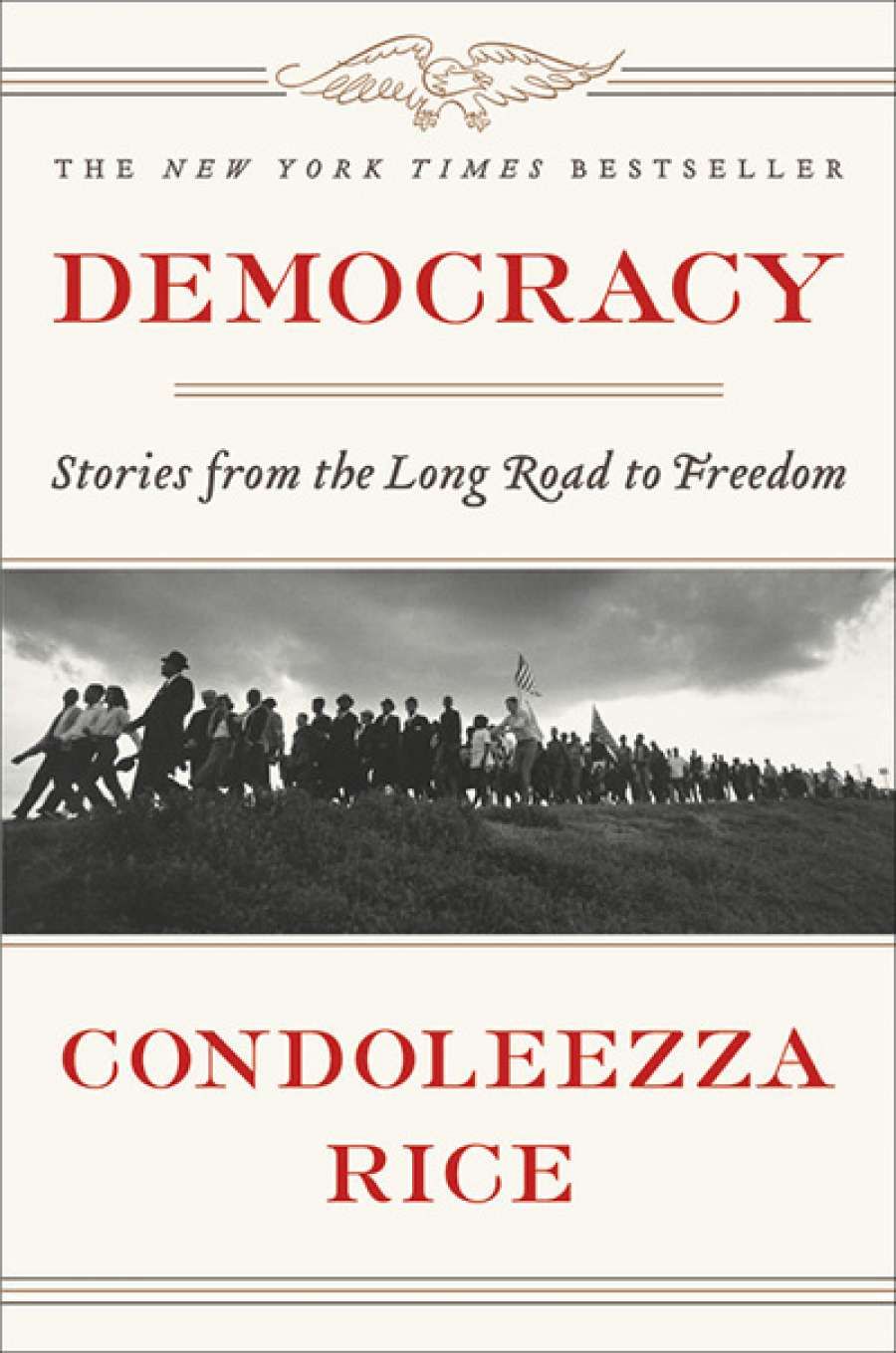
- Free Article: No
- Contents Category: Politics
- Custom Article Title: Mark Chou reviews ‘Democracy: Stories from the long road to freedom’ by Condoleezza Rice
- Custom Highlight Text:
What are the cornerstones of democracy? If you ask Condoleezza Rice who, as the sixty-sixth US secretary of state, was responsible for introducing democracy to autocratic states like Afghanistan and Iraq, her answer would go something like this: the right to speak one’s mind; freedom from arbitrary rule; leaders empowered by popular consent; equilibrium between the three branches of government and between federal and state power, minorities and the majority, state and society.
- Book 1 Title: Democracy
- Book 1 Subtitle: Stories from the long road to freedom
- Book 1 Biblio: Twelve, $US35 pb, 496 pp, 9781455540181
Her uncle was right on both counts. Wallace did go on to become governor. But the promise that he had campaigned on – ‘segregation now, segregation tomorrow, segregation forever’ – was soon eclipsed by the civil rights movement, or what Rice calls ‘America’s second democratic opening’. Her family, like countless other black families at the time, participated in this democratic transition even before they had any reason to believe in victory. Their faith, to this extent, was no different from that of the Founders when they first asked the nation to trust in a set of untested institutions. ‘This inexplicable faith in the rights enshrined in American institutions,’ Rice writes, ‘played a crucial role in finally gaining those rights, because it left open a pathway to change the course of America without resorting to violence.’
Readers familiar with US politics will probably detect in these and other passages the unspoken presence of Alexis de Tocqueville, the French aristocrat who travelled through America in the early 1830s and wrote Democracy in America. Rice does cite Tocqueville when describing democracy’s ‘ceaseless agitation’. Yet it is what she leaves unacknowledged – his insights about democracy and faith – that may help readers navigate her book’s real contribution.
What Tocqueville realised during his travels was that democracy operated much like a religion because of how much it was underpinned by faith. People believed in it, entrusted their lives to its institutions, even when all the observable evidence suggested it was destined to disappoint. It didn’t matter that democracy was a political system that often lacked disciplined leadership or political foresight; people remained inexplicably confident in democratic institutions no matter how chaotic or trite things got. For Tocqueville, it was this immovable faith in democracy that gave it the unique ability to absorb and survive body blows capable of knocking autocratic regimes in Europe to the ground.
 Condoleezza Rice and President George W. Bush, 2006
Condoleezza Rice and President George W. Bush, 2006
(photograph by Eric Draper, White House, via Wikimedia Commons)
To understand this point is also to understand why Rice has written this book now – a question interviewers have repeatedly asked her. Hoping to elicit from the former secretary of state a critique of the Trump administration, most interviewers have come away disappointed by her diplomatic responses. More than any other answer, Rice merely reiterates her book’s key point: let’s have faith that our democratic institutions will continue to maintain the necessary checks and balances, as they always have. But Rice’s calm response belies a deep sense of concern at what is happening both at home and abroad. Having written a book about democracy and faith, she fully understands that keeping faith with democracy’s institutions has become a hard ask, not simply for many Americans, but for countless citizens in Western democracies too. As she writes, there is growing scepticism about ‘the actual practice and feasibility’ of the democratic enterprise. She is not wrong. Globally, if we look at recent Freedom House data, we see that the five years leading up to 2010 recorded the longest period of democratic decline across the globe in nearly forty years. Studies of the World Values Survey tell us that citizens in consolidated democracies are becoming increasingly cynical about the value of democracy; a finding frequently reiterated by surveys in Australia. In Europe, authoritarian and populist parties like Hungary’s Jobbik, France’s Front National, and Greece’s Golden Dawn have slowly become mainstay political opposition movements. Then there is the rise of authoritarian powers like Russia and China, now busy promoting political norms and institutions within their ever-expanding spheres of influence.
Domestically, for Rice, ‘taking stock of our internal affairs reveals some ugly truths’ as well. Commentators like David Brooks have written about the rise of an anti-political sentiment, harnessed by Donald Trump, which seeks to shut down democratic compromise and the legislative process for ‘bashing and pummelling’. Studies reveal that the overarching trait shared by Trump supporters is their penchant for authoritarianism. To cap things off, polls reveal that significant numbers of Americans (forty per cent according to one Stanford University poll) ‘have lost faith in American democracy’. In a startling June 2016 Gallup survey, it was found that, whereas seventy-three per cent of Americans had either a ‘great deal’ or ‘quite a lot’ of confidence in the military, only six per cent of Americans had ‘quite a lot’ of confidence in Congress.
Most worrying of all is how decisively the Four Horsemen of the Apocalypse that Rice writes about – populism, nativism, protectionism, isolationism – today stand as a repudiation of the cultural movements of the 1960s and 1970s which, among other things, led to America’s second democratic opening. Proving Tocqueville right, her book is thus a cautionary tale of faith and its demise. When citizens lose faith in democracy, democracy loses its ability to weather the crises it faces. America’s implicit renunciation in 2016 and 2017 of the democratic opening that enabled someone like Condoleezza Rice – a black woman from Alabama – to become the country’s highest-ranking diplomat stands for all that democracy has to lose if what we have seen recently continues to take hold.


Comments powered by CComment